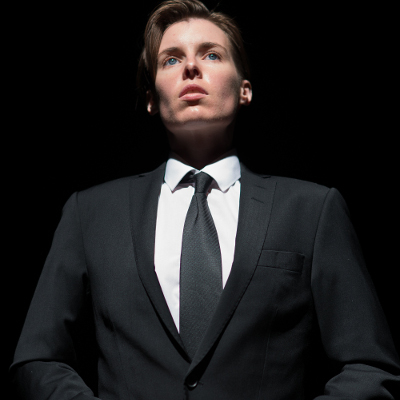Drag King Richard III (Riverside Studios)

© Jamie Scott-Smith
Terri Power‘s play was written in 2003 as a personal and political snapshot of LGBTQ experience in the US – a time when rights, protection and recognition were all in short supply.
Childhood friends La Femme and Laurie grow up together in a small Bible-belt town where nothing happens unless you make it. The girls’ crazy stunts lead to them joining a drama club, where they both audition for parts in Shakespeare’s Richard III. And it’s when Laurie appears excruciatingly embarrassed to be wearing a dress for her role as Queen Margaret, and even parents are whispering that she looks like ‘a boy in drag’, that her best friend realises just how hard Laurie is struggling with her identity.
The play blends autobiography with scenes from Richard III, with Richard’s recognition of his own body’s drastic shortcomings reflected in Laurie’s disgusted rejection of her femaleness, and her journey towards full gender reassignment as Laurence.
Drag King Richard III has recently been recast, and this may explain the rather uncomfortable sense that further rehearsal is needed to sharpen up the performances and the delivery of lines at the right time.
Anne Zander‘s beautiful cheekbones and immaculate haircut make her a stunning looking Laurence. Her physical tension perhaps reflects Laurence’s own unhappy sense of self, but she seems ill at ease in her speeches as Richard III, though more comfortable with the modern-day dialogue.
Bonnie Adair is a relaxed and naturalistic performer and the story is told from her viewpoint as La Femme, a puzzled – even dismayed – woman who must completely rethink the terms of her friendship.
The sparring scene between Richard III and Lady Anne is performed to a tango, which looks too contrived to serve as anything but a distraction – though the fake penis that’s revealed during their exchange is also a pretty convincing scene stealer.
The real pathos comes closer to the end of the play where Laurence reveals how irrevocably his family have rejected him when he announces his plans for gender reassignment. And he knows that his life partner will never be accepted into the family as his wife.
Drag King Richard III ends rather abruptly, with no resolution as to how successful Laurence’s operation has been in establishing his male identity. It’s a brave and uncompromising piece, but this production struggles to establish the relevance of its links with Shakespeare’s characters.










